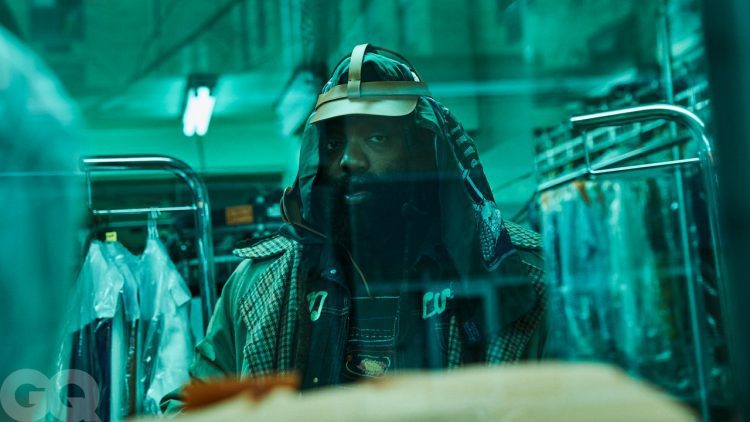I last saw Tremaine Emory in the flesh in early spring, shortly after the profiling incident at the bakery. We were in Paris, at Off-White’s Spaceship Earth show at the Palais Brongniart, the brand’s first to be held posthumously after Virgil Abloh’s passing last November. Abloh shows remain sorrowful: transmitters of memory, reminders of loss. Yet following the rawness and shock of November’s Louis Vuitton show in Miami, and then the deliberate ceremonial weight of January’s autumn/winter 2022 Paris chapter, the atmosphere at the Palais was more joyous, less laden. Outside, the crowds were screaming for Rihanna and A$AP Rocky and Pharrell. Inside, the milling crowd included Nigo, Jerry Lorenzo, Grace Wales Bonner, Olivier Rousteing and Ibn Jasper. Amongst all these luminaries of the cultural arts universe, attention orbited around Emory, too. The delight at his appointment appeared universal, evidenced in the many enthusiastic handshakes and back slaps heading his way. “People seem to be really happy about it, happy for me, and happy for Supreme—just happy in general about it,” Emory says. “So I was a bit overwhelmed, in a good way.”
You could, if you wanted, chart Emory’s ascent to the lead creative position at what is arguably America’s most influential streetwear brand solely via his employment history. His first fashion job was on a J.Crew shop floor in the early aughts. He came up through a buzzy array of creative projects in fashion, parties, music and art, chiefly via his multidisciplinary practice No Vacancy Inn, which he put together with one of his closest creative collaborators, Acyde. More recently, Emory’s fashion brand Denim Tears has explored fashion’s relationship with African American history and exploitation, all while embracing high street collaborations with the likes of Levi’s and UGG; the brand’s American flag-embroidered look featuring Tyson Beckford was included in the Met Costume Institute’s 2021 exhibition “In America: A Lexicon of Fashion”. There are stories about working with Kanye, Frank Ocean, André 3000 and Virgil himself. But Emory’s is a life whose recent chapters cannot be fully understood unless you dive into his earlier material. As Emory says: “It all goes back to how I was raised.”
“We are obsessed by youth but the older I get, the more interested I am in how your soul finds its patina through time.”
Emory was born in Georgia in July 1981. A few months later, his mother Sheralyn and father Tracy moved the family to Jamaica in Queens, New York. His mother ran the household and was assiduous in exposing her sons to culture. Emory remembers seeing Pavarotti sing with the Harlem Boys Choir in Central Park, and seeing Cats on Broadway, and visits to the Queens Natural History Museum. At age six, he was taken to the pet store and chose himself a “beautiful little cat, a calico, striped and golden,” whom he christened “Fashion”. He also cites his Uncle Ray, a brick mason at the time, as a style influence: “The way he wore his hat was so important to him. The way he walked, the way he wore flannel or tucked his T-shirt, the way he wore a fedora or a trucker cap.”
Emory says he feels lucky. For many of his neighbors, the awareness of a life outside of Queens, let alone the US, was faint. But in Tracy, he had a father who lifted his eye to a telescope to a world beyond. “He was a cameraman for CBS News for years. I remember at school being proud: he had the coolest job on careers day. The stories that affected him most were when he was in Africa, traveling with Mayor David Dinkins to meet the Pope and Nelson Mandela in South Africa, and covering the Rwandan genocide.” Emory remembers watching Washington’s American football team (“back then they were called the Redskins but no longer, thankfully”) play the New York Giants from the press box. Sport and its lessons were fundamental. So too was the march, also in Washington, that Tracy and Sheralyn walked with their sons and 250,000 others to mark the 20th anniversary of Martin Luther King’s original 1963 march, at which he delivered his “I Have a Dream” clarion call. The Emory boys were encouraged to read: seminal texts include James Baldwin’s The Fire Next Time and The Andy Warhol Diaries.
Source by www.gq.com


